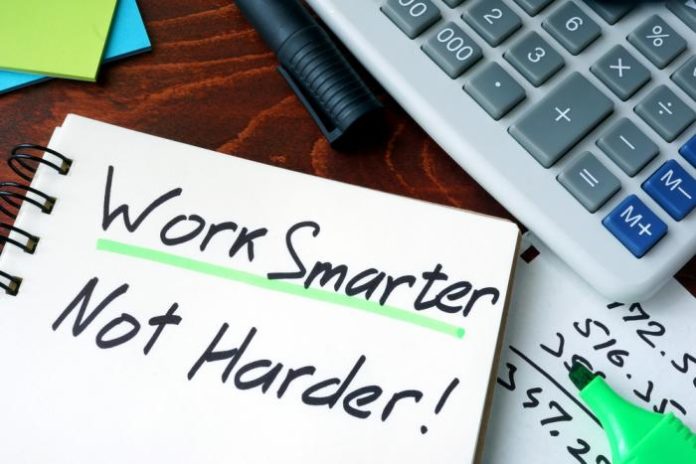How To Use Your Time More Profitably
The concept of productivity may sound rather dull – a boring piece of management- speak if ever there was one. Yet how productive you are in terms of getting things done is critical to your profitability as a person.
We saw in the Profit Formula that the number of hours you bill for being a ‘multiplication’ factor:
Income = (hourly rate x billable hours) – costs
That is, a small improvement in billable hours can have a big impact, because its effect is multiplied by your hourly rate. Yet there are only so many hours in a week, and you don’t really want to spend your evenings and weekends slaving away to increase your income…
So how do you increase your number of billable hours? You must increase your productivity.
Now that doesn’t mean that you have to turn into a work machine, trying to do several things at once, and not giving any one task the attention it deserves.
What it does mean is that you should learn how to get the most from your time, using the hours you have to greater advantage.
And in order to do that, you must learn to value your time.
How To Value Your Time
I wish I knew who wrote this – it really puts the value of time into perspective:
Imagine there is a bank that credits your account each morning with $86,400.
It carries over no balance from day to day. Every evening deletes whatever part of the balance you failed to use during the day.
What would you do? Draw out ALL OF IT, žinoma! Each of us has such a bank. Its name is TIME.
Every morning, it credits you with 86,400 seconds. Every night it writes off, as lost, whatever of this you have failed to invest to good purpose. It carries over no balance. It allows no overdraft.
Each day it opens a new account for you. Each night it burns the remains of the day. If you fail to use the day’s deposits, the loss is yours. There is no going back. There is no drawing against the “tomorrow.” You must live in the present on today’s deposits.
Invest it so as to get from it the utmost in health, happiness, and success! The clock is running. Make the most of today. Treasure every moment that you have! And remember that time waits for no one.
Yesterday is history. Tomorrow is a mystery. Today is a gift. That’s why it’s called the present!
(Author unknown)
We often tend to think of them as a disposable commodity. If a complete stranger asked you to put your hand in your pocket and give him ten dollars, you would very likely give him a few choice words instead. But if you get held up in a traffic jam for ten minutes, you are likely to brush it off as a minor inconvenience.
Po visko, it didn’t cost you anything except a little time.
Yet time is by far the most valuable commodity we have. We only have a limited amount of it, and if we waste it, it’s gone forever. Remember that when you sell your time by the hour, you are auctioning off your life in bite-size chunks.
So How Much Is Your Life Worth?

Don’t sell yourself short. A common mistake is to calculate how much you could earn per hour at a full-time job, over a 9-5 working week. But freelancing is very different to regular employment. As an employee, you get paid just for turning up. You’re getting paid when you’re chatting at the water cooler, visiting the restroom – and even when you’re sick or on vacation.
As a freelancer, you only get paid for the hours you put in for a particular client. All the time spent on interruptions, administration and personal matters have to be accounted for out of your own pocket.
Let’s say you decide to charge $50 an hour, and expect to work 40 hours a week. At first this looks pretty good – hey, you’re going to make over $100,000 a year. But when you start deducting time spent on vacations and illness, you find your revenue dropping sharply. Then there’s all the time devoted to looking for work, managing your finances, and everything else.
By the time you’ve finished deducting all this time-sucking overheads, you may find that, on average, you are earning nearer $15 an hour. That’s not much more than you could earn part-time in McDonalds.
So improving your productivity can have a real impact on your earnings. Faktiškai, if you can reclaim an extra hour a day in billable time, your earnings (adresu $50 an hour) would increase by $13,000 over the course of a year.
And to get that extra hour back, you need to learn the secrets of effective time management.
The secrets of effective time management Good time management is not an innate skill.
We all work with varying degrees of inefficiency, struggling to get things done, but continually being distracted by everyday life. How often have you started the day with a single objective in mind, yet somehow reached the end of the day with that objective still out of reach?
It’s a familiar problem, but the good news is that it can be tackled. Effective time management is something that can be learned and developed.
If you’re a creative person, such as a writer or designer, you are more likely than most to have a problem with time management. Creative people tend to have fewer left-brain skills, and so find logical tasks such as time management more difficult.
That doesn’t mean you have an excuse for avoiding time management – it just means you need to work harder at it.
To start with, you need to understand what time management is, and – more importantly – what it’s not…
Time Management is not doing the wrong things quicker. That just gets us nowhere faster. Time Management is doing the right things.
So let’s take a look at the right things you need to do get things done.
Discover Your Best Working Time
Are you an early bird or a night owl?
Finding out which time of day suits you best can have a big impact on your productivity.
One of the big advantages of being a freelancer is that you have greater freedom over your choice of working hours. You are not tied to a 9-5 schedule from Monday to Friday.
So take some time to analyze when your most productive times are. If you work more efficiently in the morning, pavyzdžiui, make sure that those morning hours are free from interruptions, so that you get the most done in the shortest possible time.
Plan Your Day
One hour of planning can save you ten hours of doing.
That’s a statement that’s worth taking notice of. So rather than rush into your day with only a vague plan of action, take enough time out to plan your schedule for the day.
Prioritize your tasks, so that you ensure that the really important things get done. Be realistic, tačiau. There are only so many hours in a day, and you won’t get more done just because you’ve drawn up a long ‘To Do’ list.
Decide what really needs to be done that day, what realistically can be done in the day, and create a schedule that takes both into account.
Tidy Your Workspace
When you’re under pressure to get things done, it can be tempting to allow documents to pile up on your desk. The few minutes taken to put things away tidily seems like an unnecessary interruption.
But when your workspace becomes disorganized, your work can become muddled, too. A few minutes hunting for a file here, a few minutes looking for a phone number there – before you know it, a big chunk of your day has been frittered away.
Handle Paper Once Only
When you come across something that you don’t know how to deal with immediately, it’s easy to put it back into your ‘pending pile’. But the more times you handle each piece of paper, the more of your time is wasted.
Try to get into a habit of dealing with documents as they arrive. When you open your mail, remember the three D’s:
Deal with it
Dump it
Delegate it.
Make sure you apply one of the above to each piece of paper that crosses your desk, each email that arrives in your mailbox, and every item on your action list.
Putting things off until tomorrow doesn’t help – it just gives you an even larger ‘to do’ list to deal with in the morning. The more you put things off, the more impossible the task becomes.
Budget Your Time
If you don’t allocate a specific time for a task, it’s easy to find that the job takes more time than it reasonably should.
Instead of concentrating on the required project, you may find your thoughts wandering.
Returning that phone call or sharpening your pencils may suddenly seem to be much more important than getting on with your work.
To avoid losing valuable time in this way, learn to budget your time effectively. Allow yourself a sensible time to complete a certain task, and then ensure that you stick to it.
Don’t get lost too much in the detail. It’s better to get on with the job and complete it than to become bogged down with minor problems and issues.
Avoid Distractions
One of the biggest problems of time management is dealing with distractions and interruptions.
You may start the day with a seemingly simple set of objectives, confident that you can complete them all with time to spare.
And then the phone rings. A client needs an urgent amendment to a recent project. You check your email and discover a problem that requires immediate attention, then a delivery arrives and you have to ensure that is dealt with properly.
Before you know it, hours of billable time are slipping away.
While it’s almost impossible to cut out such interruptions altogether, you can minimize the damage. Make it clear that when you are working, you are not to be disrupted by ordinary domestic issues. Avoid checking your email until your priority projects are out of the way. And get an answering machine or voice mail service to screen your calls while you are busy.
Most important of all, learn to say ‘no’. People will just have to learn that during your working hours, you are simply not available to help with matters that can wait until later.
How To Set Goals And Attain Them

How many times have you set a New Year’s resolution, only to have forgotten all about it by mid-January? Setting career goals is one thing. Achieving them is something else altogether. Yet if you apply the following three simple tips, you will find that it is much easier to attain your goals.
Quantify Your Goals
Saying that you want to earn more money, or have a better lifestyle is all very well, but how do you measure your success? Instead of being vaguely ambitious, put specific figures on your goals. If you state that you want to earn $100,000 a year, then you have a specific target to aim for – and you will know exactly when you get there.
Put Your Goals Into Writing
The simple act of committing your goals to paper is a major step towards achieving them. Once you have written them down, there is no doubt about what you are committing yourself to – it’s hard to argue with evidence in print.
Set Yourself A Deadline

A goal without a deadline is pretty meaningless. It’s easy to keep postponing a target that has a never-ending shelf life. Give yourself a deadline, and you will find that you work harder to hit it.
How To Get 25 Hours Out Of Every Day
Research shows that 75% of American workers regularly complain that they are tired. This isn’t too surprising, as the average worker apparently gets less than seven hours sleep a night. So the vast majority of people start the day firing on just three cylinders. No wonder that poor productivity is such an ongoing issue.
But it gets worse. Some 40% of working people skip breakfast, ir 39% miss lunch. And of those that do manage a break for lunch, half allow themselves 15 minutes or less. These are big problems, especially where time management is concerned. If you think that working late nights, burning the candle at both ends and missing meals makes you a hard worker, you really are missing the point.
Productivity depends not just on the hours that you put in, but also on the quality of work that you produce. If you are tired and not eating properly, your productivity will plummet. As your blood-sugar level drops, your body automatically slows you down to conserve energy. Add tiredness on top of this, and you might as well give up all pretense at working. The lights may be on, but there’s probably no-one at home.
That’s the negative side. Now let’s turn things around and look at the positive. Increasing your fitness can have a really dramatic effect on your productivity. You don’t need me to tell you what that entails – regular exercise, getting enough sleep, eating nutritious food and establishing a routine that your body can become familiar with.
Don’t forget to take regular breaks. Your body and mind needs to relax from time to time – you can’t operate for hours continuously like a machine.
We all know that getting in shape is easier said than done. But if you can improve your level of fitness, you will be amazed at the impact this can have on your working life. You will approach each day fresh and with greater enthusiasm. You will find it easier to solve problems, and you will get more done than you ever imagined possible. If there was ever a way to get 25 hours out of each day, fitness is it. Look after your health, and your wealth will take care of itself.
Most of all, try to ensure that you are undertaking work that you enjoy. That way, you can enjoy the journey as well as the destination. Thomas Edison said that he never did a day’s work in his life – it was all fun!
That surely is the best way to get the most from every week of your working life.




